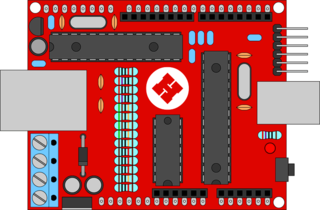Project:Nanode: Difference between revisions
| (329 intermediate revisions by 55 users not shown) | |||
| Line 1: | Line 1: | ||
[[File:Nanode5_red.png|320px|right|thumb| Nanode 5]] | |||
=Nanode= | |||
==We have been nominated for an award == | |||
9-12-2011 | |||
Nanode has been nominated for an award as the Best Internet of Things Open Source Project 2011. You can support Nanode with your vote here http://postscapes.com/best-iot-open-source-project-2011 | |||
Thankyou for your support. Team Nanode. | |||
It | ==A 30 second pitch== | ||
Nanode is an open source Arduino-like board that has in-built web connectivity. It connects to a range of wireless, wired and ethernet interfaces. | |||
It allows you to develop web based sensor and control systems - giving you web access to six analogue sensor lines and six digital I/O lines. | |||
It costs under £20 as an easy build it yourself kit. Nanode was designed with Hacking in mind. | |||
==How to get one?== | |||
Here is a [http://shop.nanode.eu list of websites] where you can purchase a Nanode kit. | |||
==What can you do with it?== | |||
Update to Pachube | |||
Anything you can do with an Arduino, and an Arduino+Ethernet shield | |||
Nanode | ==Where else to look== | ||
'''FAQ''' here's a list of [[Project:Nanode/FAQ | Frequently Asked Questions]] about the Nanode | |||
'''Registration''' - Add your newly built Nanode to the [[Pledges/Nanodes/Details#The_Complete_List | Register of Nanodes and Users]] | |||
'''Documentation''' PCB Files, schematics and other useful pdf [[Project:Nanode/docs | Documents]] | |||
This is the | '''Nanode 5 Build Guide''' - this shortcut takes you to the [[Project:Nanode/Building_a_Nanode | Pictorial Building Guide]] This is the definitive assembly guide in photos - which replaces more traditional parts lists, schematics and component insertion lists - please read this before you start soldering! | ||
'''Nanode RF Build Guide''' - here is a [[http://ichilton.github.com/nanode/rf/build_guide.html Pictorial Building Guide for the Nanode RF]] | |||
'''Wi-Node Build Guide (Standalone)''' - here is a [[http://ichilton.github.com/nanode/wi-node/build_guide.html Pictorial Building Guide for the Wi-Node as a standalone board.]] | |||
'''Wi-Node Build Guide (Backpack for Arduino/Nanode 5)''' - here is a [[http://ichilton.github.com/nanode/wi-node/backpack_build_guide.html Pictorial Building Guide for the Wi-Node as a backpack/shield for an existing Arduino or Nanode 5 board.]] | |||
Here | '''Applications''' - Here's a list of [[Project:Nanode/Applications | Applications]] currently under development on the Nanode | ||
[[ | '''Nanode News''' - the latest happenings on the Nanode Project [[Project:Nanode/News | here]] | ||
The | The previous version of this page [[Project:Nanode/scratch]] - this has a vast amount of content. search in here for help/info/problems | ||
Ian Chilton has started to maintain a page of [http://ichilton.github.com/nanode useful Nanode links], including pointers to [http://github.com/ichilton/nanode code] and libraries for the various functions of the Nanode and Nanode RF. | |||
==What we need help with== | |||
Sorting out the vast amounts of info that have been dumped here. | |||
The idea is to have lots of project pages with the Project:Nanode namespace. Each project page would have a bunch of info+links. The intention is to make them into 'chapters' that people can refer to, or download. Most content resides in [[Project:Nanode/scratch]]. It just needs splitting up. | |||
[[Category:Projects]] | |||
Latest revision as of 21:09, 14 August 2013
Nanode
We have been nominated for an award
9-12-2011
Nanode has been nominated for an award as the Best Internet of Things Open Source Project 2011. You can support Nanode with your vote here http://postscapes.com/best-iot-open-source-project-2011
Thankyou for your support. Team Nanode.
A 30 second pitch
Nanode is an open source Arduino-like board that has in-built web connectivity. It connects to a range of wireless, wired and ethernet interfaces. It allows you to develop web based sensor and control systems - giving you web access to six analogue sensor lines and six digital I/O lines. It costs under £20 as an easy build it yourself kit. Nanode was designed with Hacking in mind.
How to get one?
Here is a list of websites where you can purchase a Nanode kit.
What can you do with it?
Update to Pachube
Anything you can do with an Arduino, and an Arduino+Ethernet shield
Where else to look
FAQ here's a list of Frequently Asked Questions about the Nanode
Registration - Add your newly built Nanode to the Register of Nanodes and Users
Documentation PCB Files, schematics and other useful pdf Documents
Nanode 5 Build Guide - this shortcut takes you to the Pictorial Building Guide This is the definitive assembly guide in photos - which replaces more traditional parts lists, schematics and component insertion lists - please read this before you start soldering!
Nanode RF Build Guide - here is a [Pictorial Building Guide for the Nanode RF]
Wi-Node Build Guide (Standalone) - here is a [Pictorial Building Guide for the Wi-Node as a standalone board.]
Wi-Node Build Guide (Backpack for Arduino/Nanode 5) - here is a [Pictorial Building Guide for the Wi-Node as a backpack/shield for an existing Arduino or Nanode 5 board.]
Applications - Here's a list of Applications currently under development on the Nanode
Nanode News - the latest happenings on the Nanode Project here
The previous version of this page Project:Nanode/scratch - this has a vast amount of content. search in here for help/info/problems
Ian Chilton has started to maintain a page of useful Nanode links, including pointers to code and libraries for the various functions of the Nanode and Nanode RF.
What we need help with
Sorting out the vast amounts of info that have been dumped here.
The idea is to have lots of project pages with the Project:Nanode namespace. Each project page would have a bunch of info+links. The intention is to make them into 'chapters' that people can refer to, or download. Most content resides in Project:Nanode/scratch. It just needs splitting up.
